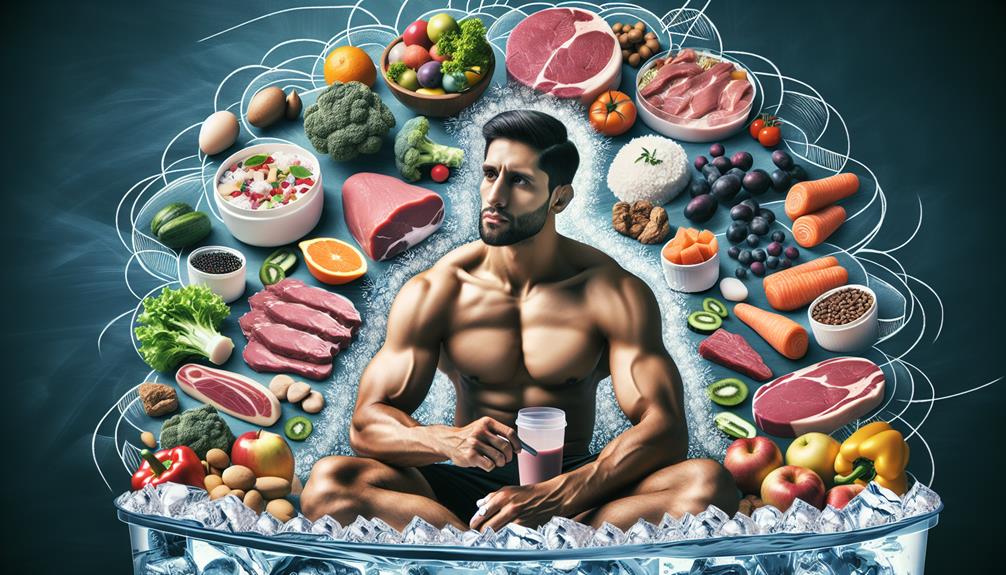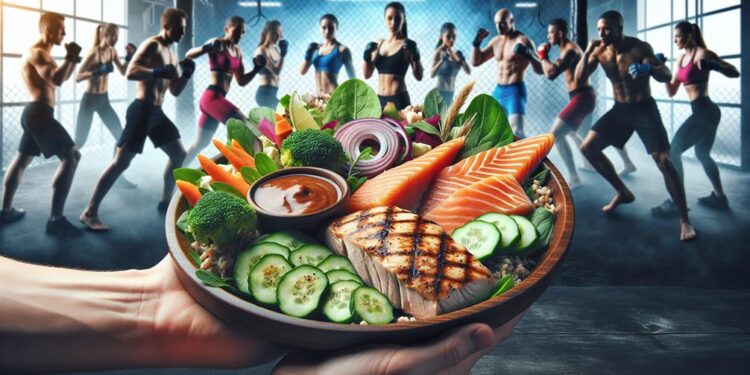Did you know that proper nutrition plays a crucial role in the performance of MMA athletes? Fueling your body with the right nutrients can enhance your strength, endurance, and overall performance inside the cage.
But what exactly does it take to optimize your nutrition for MMA? In this discussion, we will explore the importance of proper nutrition, pre-fight meal strategies, hydration techniques, key nutrients for MMA athletes, and post-workout recovery techniques.
So, if you're looking to take your MMA game to the next level, keep reading to discover the secrets of fueling your body for peak performance in the Octagon.
Key Takeaways
- Proper nutrition is essential for fueling training and muscle recovery in MMA athletes.
- A well-balanced diet that includes carbohydrates, proteins, and healthy fats is important for optimal performance.
- Timing and macronutrient balance are crucial for pre-fight meals to provide sustained energy and support muscle recovery.
- Hydration plays a significant role in performance, and athletes should establish baseline hydration needs and consistently drink water throughout the day, using sports drinks during intense training sessions or fights.
Importance of Proper Nutrition
Why is proper nutrition essential for optimal performance in MMA?
Nutrition guidelines and weight management play a crucial role in an MMA fighter's performance. Proper nutrition provides the necessary fuel for training, helps in muscle recovery, and aids in maintaining an optimal weight class.
Nutrition guidelines for MMA fighters focus on consuming a well-balanced diet that includes macronutrients such as carbohydrates, proteins, and healthy fats. Carbohydrates are the primary source of energy and should make up a significant portion of an athlete's diet. Proteins are essential for muscle repair and recovery, while healthy fats provide energy and support hormone production.
Weight management is a critical aspect of MMA, as fighters need to compete within specific weight classes. Proper nutrition helps fighters maintain their weight while ensuring they have enough energy for training and competition. By following nutrition guidelines, fighters can fuel their bodies effectively and avoid weight fluctuations that may impact their performance.
Pre-Fight Meal Strategies
One important aspect of preparing for a fight is implementing effective pre-fight meal strategies. These strategies can help optimize your energy levels, enhance your performance, and ensure that you're properly fueled for the fight ahead.
Here are four key components to consider when planning your pre-fight meals:
- Timing: It's crucial to time your meals appropriately to allow for digestion and absorption. Eating a well-balanced meal around 2-3 hours before the fight gives your body enough time to process the nutrients and provide sustained energy during the fight.
- Macronutrient balance: Your pre-fight meal should include a combination of carbohydrates, protein, and healthy fats. Carbohydrates provide the primary fuel source for high-intensity exercise, while protein aids in muscle recovery and repair. Including healthy fats can help slow down digestion and provide a steady release of energy throughout the fight.
- Hydration: Proper hydration is essential for optimal performance. Start hydrating well before the fight and continue sipping on fluids leading up to it. Avoid excessive caffeine or alcohol, as they can dehydrate your body.
- Weight cutting techniques and pre-fight supplements: It's important to work with a nutritionist or dietitian to develop safe and effective weight cutting techniques. Additionally, some athletes may benefit from using pre-fight supplements, such as creatine or beta-alanine, to enhance performance and recovery.
Hydration for Optimal Performance
Staying properly hydrated is essential for achieving optimal performance in MMA. Hydration techniques and strategies play a vital role in ensuring that your body functions at its best during training and competition.
First and foremost, it's important to establish a baseline for your hydration needs. Weigh yourself before and after a training session to determine how much fluid you've lost through sweat. For every pound lost, aim to consume 16-24 ounces of fluid to replenish your body's water stores.
To stay hydrated throughout the day, make it a habit to drink water consistently. Carry a water bottle with you and sip on it regularly, even when you're not thirsty. This will help maintain proper hydration levels and prevent dehydration from setting in.
During intense training sessions or fights, consider using a sports drink that contains electrolytes. Electrolytes are minerals such as sodium, potassium, and magnesium, which are lost through sweat. Replenishing these electrolytes can help maintain fluid balance and prevent muscle cramps.
In addition to fluid intake, consume foods with high water content, such as fruits and vegetables, to further support hydration. These foods not only provide water but also contain essential nutrients that are beneficial for your overall health and performance.
Key Nutrients for MMA Athletes
To optimize your performance in MMA, it's crucial to fuel your body with key nutrients that support your training and recovery. Here are four essential nutrients that MMA athletes should incorporate into their diet:
Protein is the building block of muscle and plays a vital role in muscle repair and growth. Aim to consume lean sources of protein such as chicken, turkey, fish, and tofu. Additionally, consider incorporating protein supplements like whey protein powder into your post-workout routine to enhance recovery.
- Carbohydrates:
Carbohydrates provide the energy needed to fuel intense training sessions. Opt for complex carbohydrates like whole grains, fruits, and vegetables, as they provide a steady release of energy. Prioritize consuming carbohydrates before and after training to replenish glycogen stores and promote optimal recovery.
- Healthy Fats:
Healthy fats are essential for hormone production and joint health. Include sources of healthy fats such as avocados, nuts, seeds, and olive oil in your diet. However, be mindful of portion sizes, as fats are calorie-dense and can impact weight management.
- Micronutrients:
Micronutrients, including vitamins and minerals, are crucial for overall health and performance. Ensure you consume a wide variety of fruits, vegetables, and whole foods to obtain a diverse array of micronutrients. If needed, consider incorporating a multivitamin or specific supplements to fill any nutrient gaps in your diet.
Post-Workout Recovery Techniques

After an intense training session, it's important to implement effective post-workout recovery techniques to optimize your body's ability to repair and rebuild. Two essential techniques to incorporate into your routine are foam rolling and stretching exercises.
Foam rolling is a self-myofascial release technique that involves using a foam roller to apply pressure to specific areas of your body. This technique helps to break up muscle knots, improve blood circulation, and alleviate muscle tightness. By incorporating foam rolling into your post-workout routine, you can enhance your body's recovery process and reduce the risk of injury.
Stretching exercises are another crucial component of post-workout recovery. Stretching helps to improve flexibility, increase range of motion, and prevent muscle imbalances. Dynamic stretches, which involve actively moving your muscles through a full range of motion, are particularly beneficial for post-workout recovery. These stretches help to loosen up tight muscles and enhance recovery by promoting blood flow and nutrient delivery to the muscles.
Frequently Asked Questions
What Are Some Common Nutritional Mistakes That MMA Athletes Make and How Can They Be Avoided?
Common nutritional mistakes include not fueling properly before training, not consuming enough protein, and neglecting hydration. To avoid these mistakes, prioritize balanced meals, adequate protein intake, and drink enough fluids throughout the day.
Are There Any Specific Supplements That Are Recommended for MMA Athletes to Enhance Their Performance?
To enhance your performance as an MMA athlete, there are specific supplements recommended. These performance-enhancing supplements can provide the necessary fuel and nutrients your body needs to reach peak performance.
How Can Nutrition and Hydration Be Adjusted for Fighters Who Compete in Different Weight Classes?
To adjust hydration levels for fighters in different weight classes, it's important to understand the impact of weight cuts on performance. Proper nutrition and hydration strategies can be tailored to meet the specific needs of each fighter, optimizing their performance in the ring.
What Are Some Recommended Meal Timing Strategies for MMA Athletes to Maximize Their Energy Levels During Training and Competition?
To maximize your energy levels during training and competition, it's important to focus on meal planning and pre workout nutrition. By timing your meals strategically, you can fuel your body for peak performance.
Can You Provide Some Tips for Managing Weight Cuts While Still Maintaining Optimal Nutrition and Performance?
To manage weight cuts while maintaining optimal nutrition and performance, focus on weight management strategies like portion control and calorie tracking. Consider incorporating performance enhancing supplements, but consult with a nutritionist for personalized advice.
Conclusion
As you wrap up your intense MMA training session, remember that proper nutrition is the key to unlocking your peak performance.
By fueling your body with the right nutrients and staying hydrated, you can optimize your training and recovery.
Don't overlook the importance of pre-fight meal strategies and post-workout recovery techniques.
These small but significant steps will help you stay at the top of your game and dominate in the octagon.
So, fuel up, hydrate, and conquer your opponents with your well-nourished body.












